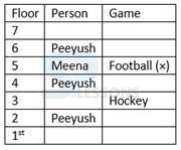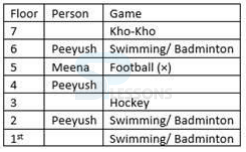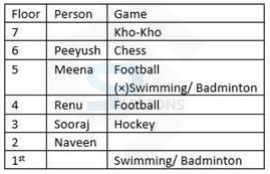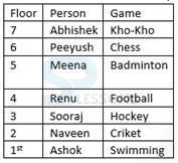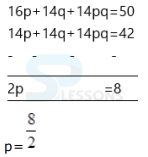 Introduction
Introduction
UK Cooperative Bank Clerk Cashier Recruitment Study Guide, will comprise of Objective Tests for 200 marks consisting of 6 Sections as follows. A composite time of 2 Hours will be given for answering the questions. The below sections gives the detailed information about UK Cooperative Bank Clerk Study Guide Section.
 Pattern
Pattern
| Sr.No. | Name of Tests | Medium of Exam | No. of Questions | Maximum Marks | Duration |
|---|---|---|---|---|---|
| 1 | Reasoning | Hindi/ English | 40 | 40 | Composite time of 2 hours |
| 2 | Numerical Ability | Hindi/ English | 40 | 40 | |
| 3 | General Awareness | Hindi/ English | 60 | 60 | |
| 4 | English Language | English | 20 | 20 | |
| 5 | Hindi Language | Hindi | 20 | 20 | |
| 6 | Computer Knowledge | Hindi/ English | 20 | 20 | |
| Total | 200 | 200 | |||
 Syllabus
Syllabus
[Click Here] for UK Cooperative Bank Online Exam Syllabus
Note: Peanlity for Wrong Answers:
There will be penalty for wrong answers marked in the Objective Tests. For each question for which a wrong answer has been given by the candidate one fourth or 0.25 of the marks assigned to that question will be deducted as penalty to arrive at corrected score. If a question is left blank, i.e. no answer is marked by the candidate; there will be no penalty for that question.
 Samples
Samples
Direction (1-5): The following questions are based on the five threeletter words given below.
347 519 952 693 814
1. If in the positions of the first and the second digits are interchanged, and then digits of numbers are arranged in ascending order. Which of the following will be the highest number?
-
A. 814
B. 347
C. 952
D. 693
E. None of these
-
A. None
B. One
C. Two
D. Three
E. Four
-
A. 693
B. 952
C. 814
D. 519
E. None of these
-
A. 30
B. 35
C. 40
D. 60
E. None of these
-
A. 8
B. 3
C. 4
D. 5
E. None of these
-
A. Naveen
B. Ashok
C. Sooraj
D. Meena
E. None of these
Explanation:
For solving such kind of puzzle you have to separate the confirm condition first:
Meena does not like Football. The one who likes Hockey lives in third floor. Meena lives on the fifth floor. There are two people lives between Peeyush and Sooraj. Peeyush lives in the even numbered floor.
More than two persons live between one who likes Swimming and one who likes Badminton i.e the one who likes Swimming/ Badminton lives on either 6, 2 or 1st floor. The one who lives in topmost floor likes Kho-Kho.
Peeyush likes Chess and lives in even numbered floor that means Peeyush is on 6th floor. Renu lives in the even numbered floor. As many persons live between Renu and the one who likes Chess is same as live between Naveen and the one who likes Football that means Renu lives in 4th floor and Naveen lives in 2nd floor.
There are two people lives between Peeyush and Sooraj. The one who likes Football is lives immediately above Sooraj. More than two persons live between one who likes Swimming and one who likes Badminton.
Ashok likes Swimming that means Ashok lives on 1st floor and it is also clear that Meena likes to play Badminton. Only one space is vacant that is for Cricket which is also liked by Naveen and Kho-Kho is played by Abhishek.
7. Which of the following groups live on the even numbered floors?
-
A. Peeyush, Renu, Sooraj
B. Naveen, Peeyush, Ashok
C. Naveen, Peeyush, Renu
D. Naveen, Renu, Meena
E. None of these
-
A. Sooraj
B. Abhishek
C. Meena
D. Ashok
E. None of these
-
A. One
B. Three
C. Two
D. Four
E. None of these
-
A. Renu does not play football.
B. Naveen lives odd numbered floor.
C. Ashok lives in the second floor
D. Sooraj plays Hockey.
E. None is true
1. Direction: In the following question, there are two equations. Solve the equations and answer accordingly:
I. 8p+7q+7pq=25
II.2p+2q=6-2pq
-
A. p>q
B. p<q
C. p≥q
D. p≤q
E. p=q OR No relation can be established(CND)
-
A. x > y
B. x ≥ y
C. y >x
D. y ≥ x
E. x = y or relationship cannot be establish
-
A. The question can be answered by using statement I alone but cannot be answered using the other statement alone.
B. The question can be answered by using statement II alone but cannot be answered using the other statement alone.
C. The question can be answered by using either of the statement alone.
D. The question can be answered using both of the statements together, but cannot be answered using either of the statement alone.
E. The question cannot be answered even by using both the statements together.
-
A. The question can be answered by using statement I alone but cannot be answered using the other statement alone.
B. The question can be answered by using statement II alone but cannot be answered using the other statement alone.
C. The question can be answered by using either of the statement alone.
D. The question can be answered using both of the statements together, but cannot be answered using either of the statement alone.
E. The question cannot be answered even by using both the statements together.
-
A. If the data in Statement I alone are sufficient to answer the question, while the data in Statement II alone are not
sufficient to answer the question
B. If the data in Statement II alone are sufficient to answer the question, while the data in Statement I alone are not
sufficient to answer the question.
C. If the data either in Statement I or in Statement II alone are sufficient to answer the question
1. Which High Court declared the “entire animal kingdom including avian and aquatic” as legal persons?
-
A. Uttarakhand High Court
B. Bombay High Court
C. Allahabad High Court
D. Calcutta High Court
E. Karnataka High Court
-
A. 1.5 lakh rupees
B. 4 lakh rupees
C. 2 lakh rupees
D. 5 lakh rupees
E. 3 lakh rupees
-
A. Tihri River
B. Yamuna River
C. Bhagirathi River
D. Ganga River
E. Narmada river
-
A. Madhya Pradesh
B. Uttar Pradesh
C. Uttarakhand
D. Assam
E. Tripura
-
A. Rajaji National Park
B. Indravati National Park
C. Dundeli Sanctuary
D. Bandhavgarh National Park
E. Gangotri National Park
-
A. Panipat
B. Ambala
C. Jhajjar
D. Rohtak
E. None of these
-
A. Application
B. Arbitrage
C. Automated
D. Adjustment
E. Assets
-
A. New Delhi
B. Jalandhar
C. Amritsar
D. Bhopal
E. Dehradun
-
A. Manas
B. Barak
C. Sankosh
D. Brahmaputra
E. Lohit
-
A. All flying
B. All flying in the sky
C. Flying for all
D. Flight towards the sky
E. Flying to sky
1. Direction: In the given question, a part of the sentence is printed in bold. Below the sentence alternatives to the bold part are given at (A), (B), (C) and (D) which may help improve the sentence. Choose the correct alternative. In case the given sentence is correct, your answer is (E) i.e. No correction required.
The Kenyan state cannot solve the systemic issues without rooting up both deep-seated corruption and incompetent officials.
-
A. Rooting about
B. Rooting out
C. Rooting for
D. Romping through
E. No correction required
-
A. Taken after
B. Taken apart
C. Taken back
D. Taken out
E. No correction required
-
A. Looking after
B. Looking down on
C. Looking for
D. Looking forward to
E. No correction required
-
A. To make slow progress in the previous two weeks
B. To be making slow progress in the next two
C. To make slow progress on the next two
D. To make slow progress over the next two
E. No correction required
-
A. pleased
B. best
C. good
D. neat
E. correct
1. Buffer is device/storage are a ________.
-
A. Where data are temporarily stored
B. Where data is permanently stored
C. Where data error occurs
D. All of the above
E. None of these
-
A. artificial intelligence
B. Very large scale integration (VLSI)
C. Both of above
D. SQL
E. None of these
-
A. firewall
B. proxy server
C. IP address
D. domain name
E. None of these
-
A. once
B. twice
C. three times
D. four times
E. None of these
-
A. how the network works
B. the other station's address
C. whether the network is packetswitched or circuit-switched
D. whether this is a voice or data network
E. None of the above
-
A. application software
B. system software
C. operating system software
D. platform software
E. None of these
-
A. gathering
B. uploading
C. inputting
D. outputting
E. downloading
-
A. Primary key
B. Foreign key
C. Secondary key
D. Relational key
E. None of these
-
A. Richer Text Formatting
B. Rich Text Format
C. Right Text Fishing
D. Right Text Font
E. None of these
-
A. algorithm
B. hardware program
C. software bug
D. firmware program
E. None of these






